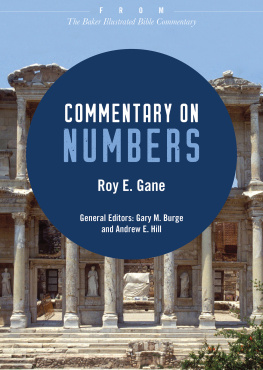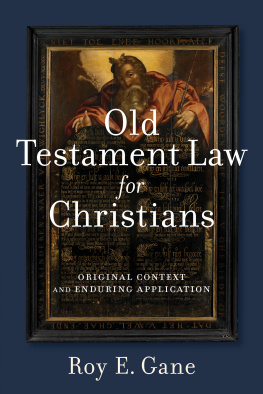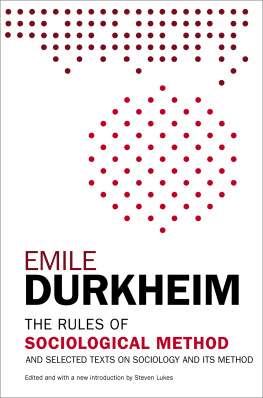ROUTLEDGE LIBRARY EDITIONS: EMILE DURKHEIM
ON DURKHEIMS RULES OF SOCIOLOGICAL METHOD
ON DURKHEIMS RULES OF SOCIOLOGICAL METHOD
MIKE GANE
Volume 1

LONDON AND NEW YORK
First published in 1988
This edition first published in 2011
by Routledge
2 Park Square, Milton Park, Abingdon, Oxon, OX14 4RN
Simultaneously published in the USA and Canada
by Routledge
270 Madison Avenue, New York, NY 10016
Routledge is an imprint of the Taylor & Francis Group, an informa business
This edition published in the Taylor & Francis e-Library, 2011.
To purchase your own copy of this or any of Taylor & Francis or Routledges collection of thousands of eBooks please go to www.eBookstore.tandf.co.uk.
1988 Mike Gane
All rights reserved. No part of this book may be reprinted or reproduced or utilised in any form or by any electronic, mechanical, or other means, now known or hereafter invented, including photocopying and recording, or in any information storage or retrieval system, without permission in writing from the publishers.
British Library Cataloguing in Publication Data
A catalogue record for this book is available from the British Library
ISBN 0-203-83814-9 Master e-book ISBN
ISBN 13:978-0-415-58427-2 (Set)
eISBN 13:978-0-203-83813-6 (Set)
ISBN 13:978-0-415-55773-3 (Volume 1)
eISBN 13:978-0-203-83814-3 (Volume 1)
Publishers Note
The publisher has gone to great lengths to ensure the quality of this reprint but points out that some imperfections in the original copies may be apparent.
Disclaimer
The publisher has made every effort to trace copyright holders and welcomes correspondence from those they have been unable to contact.
On Durkheims Rules of Sociological Method
Mike Gane
ROUTLEDGE
London and New York
First published in 1988
by Routledge
First published in paperback in 1989
by Routledge
11 New Fetter Lane, London EC4P 4EE
29 West 35th Street, New York, NY 10001
Mike Gane 1988
No part of this book may be reproduced in any form without permission from the publisher except for the quotation of brief passages in criticism
Library of Congress Cataloging in Publication Data
Gane, Mike.
On Durkheims rules of sociological method.
Bibliography: p.
Includes index.
I. SociologyMethodology. 2. Durkheim, Emile, 18581917. I. Title.
HM24.G287 1988 301.018 8723556
British Library CIP Data also available
ISBN 0-415-04252-6
Contents
We must make therefore a complete solution and separation of nature, not indeed by fire, but by the mind, which is a kind of divine fire.
(Bacon, 1620)
Preface
This book began its life as a critical essay and its aim has remained essentially a modest one. Far from being an attempt to construct a finished methodological treatise or to present a definitive commentary on Durkheims Rules, methods, oreven more ambitiouson the methods of the Durkheimian school, its central objective is to put into question some general and strongly persisting misconceptions of Durkheims research strategies.
It is certainly something of a paradox that Durkheims short book, The Rules of Sociological Method, acknowledged as a classic and available in two English translations, is both widely read yet seems to remain in some vital respects unknown. Even the most apparently authoritative considerations of its arguments seem to me quite perverse. The reasons for this state of affairs interest me in their own right, and I devote some attention to trying to work out precisely how the text has been read. The generally dire level of the discussion of this text has meant that much of the debate on its arguments has either been polarised in fixed awkward positions, or simply gone round in circles.
In this book I try to begin to argue, by working from some of the often neglected aspects of Durkheims text, that the work is more complex and challenging than is currently assumed. I must confess to a curious sense of unease when I have felt irritation over naive criticisms of this work since I am not a Durkheimian in the pure sense. There is nothing, however, to be gained by oversimplifying Durkheims arguments in order to demolish them; yet obviously, there is some insufficiency simply in presenting the real argument, even if it is salutary for sociologists to have to face up to it. I therefore try to open out and discuss the remarkable ingenuity of this short work and to try to discover the way in which it works as a unified and unifying sociological manifesto. Further: analyses of Durkheims work, I suggest, which fail to take into account the perspectives in which the Rules was shaped, seem unable to grasp the key elements of Durkheims project.
Acknowledgments
I first encountered Durkheims work as a first year undergraduate in sociology at Leicester University in 1965. In many direct and indirect ways this essay on the Rules owes a great deal to the intellectual milieu of the Department of Sociology at Leicester, particularly my immediate teachers and fellow students but also other sociologists who were active there in the mid 1960s, and during the year I taught there (19712). I have also continued to discuss Durkheimian themes with sociologists who subsequently joined that department. I would also like to thank all those who have participated in discussions at seminars not only at Leicester but also Birmingham, Essex, Hull, Keele; and the many colleagues and students at Loughborough University with whom I have discussed problems raised in this book. A number of my papers on Durkheim and Mauss have been published in the journal Economy and Society and I would like to thank the editors for providing critical and constructive observations. I have also had considerable help from Monique Arnaud, who not only helped with translating some of Durkheims passages into English, but also provided critical responses to some of my initial ideas.
Abbreviations of Titles
Division published as De la Division du Travail Social: tude sur lOrganisation des Socits Suprieures, 1st ed., 1893, 2nd, 1902; Paris, Alcan. English translations, both entitled The Division of Labour in Society, by G.Simpson (1964b 1933)), and W.D.Halls (1984).
Rules published as a set of articles, Les Rgles de la Mthode Sociologique in Revue Philosophique de la France et de l'tranger, 1894, 1st ed., 1895, Alcan, 2nd ed., 1901, etc. English translations, both entitled The Rules of Sociological Method, by S.A.Solovay and J.H. Mueller (1964a (1938)), and W.D.Halls (1982).
Educational Thought published posthumously as Lvolution Pdagogique en France, 1938, PUF; given as lectures in Paris in 1904 as LHistoire de lEnseignement en France. Translation by P.Collins, entitled The Evolution of Educational Thought in France: Lectures on the Formation and Development of Secondary Education in France






